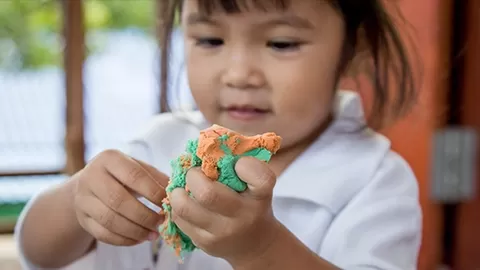In this fast-moving world, people tend to be a lot more impatient. The lack of patience is even more obvious when they are required to wait for things. As the world develops, people live more comfortably, and things can be obtained easily. Because of this, children are getting less and less patient.


During our children’s growing up years, we should help them cultivate patience in their life as well as teach them how to control their emotions. This is because, a child that could not self-regulate his emotions and one who lacks patience may get stressed or frustrated easily. Hence, we need to teach our children to focus on their goals while also practicing patience – and wait to get what they want.
Why being patient is so important to a child's growth?
This is because personality is a better measure of success than intelligence1. In a tech savvy environment, everyone will have access to the same information and will be able to learn all kind of things2. However, not everyone is taught to be patient and will be able to self-regulate themselves when learning. Hence, people that can maintain patience when dealing with difficult situations are deemed to be more successful3.
In a research carried out by Stanford University called ‘The Marshmallow Test’4, children between the ages of 4 and 6 were left alone with a marshmallow in a room. The children are given two choices – they can either eat the marshmallow instantly or wait patiently for 15 minutes and get more marshmallows in return. The results of the research show that children are more tolerant when they are growing up and they are better at adapting and socializing. Moreover, it also shows that children are capable of self-control and patience can help them to self-regulate their emotions. People who can wait patiently tend to be punctual, more rational and are able to achieve their goals and become successful in life.
So, it is the parents’ duty to help cultivate patience in your children by making yourselves as good examples for them. Parents can observe their children’s patience through their behaviour in daily lives. For example, while waiting in a queue, what do they do? Did they wait patiently or irritably, complain or get stressed out about it, or worst case, were they angry about it. If they were impatient, how would you respond to them? The best advice is to talk to the children calmly and reason with them to make them understand the situation. All these would affect the growth of the children because they are at the age where they will absorb and imitate whatever the adults are doing, shaping their character for the future.


Here are the recommended activities that you can do with your children to teach them about self-regulation:
Recommended activities for children 1 year and above. |
Description |
Start with their daily lives |
You can start to teach your children to be patient by taking small and short steps in their daily lives, such as, asking them to calm down and wait quietly for 1-2 minutes before you give them their food or toys. It may seem like a short while, but at least it is a good start. Eventually, you will be able to push your children to be more patient for a longer period of time until their desires are met when they grow older. |
Teach them to care for themselves |
They are various ways for you to coach them to be independent. You can start with giving them small responsibilities such as folding their own clothes, tidying up their toys, washing their own hands before eating and etc., and from there, slowly move to more difficult activities as the child grows. Coping with difficulties in completing the task allows the children to learn to be more patient. When you see that a certain task is not completed by the children, give them some encouragement to finish it and if the activity is too difficult for them, do lend them a helping hand. |
Taking turns |
Nothing beats waiting for their own turn for something fun when you are teaching your children to be patient. The only way to get better is to put them into constant practice. For instance, if your children struggle with waiting for their own turn for a game in the park, you should make more trips to the park and not less frequent, to reinforce the need for them to be courteous and patient. The repeated cycle will help them learn to wait. |
Create " tap for permission " rule |
Parents can set rules for the family. In order to train your child to wait under different scenarios such as when your child wants to request for something while you are working or talking to other people, ask the child to touch your hands or arms to indicate the need to speak. If you tap back, the child can then say what they wanted to say but if the parent do not give any response, the child will have to wait patiently for the parent to respond. |
Purposeful delays |
Purposefully delaying some things that your children want may help teach them patience. For example, if your daughter or son wants a new toy, only get it for them during a special occasion such as their birthdays instead of buying it for them without a reason. This may help teach them that they can wait for the things that matter to them. |
References:
1. https://www.independent.co.uk/news/science/personality-iq-success-wealth...
2. https://tech.co/news/6-main-ways-technology-impacts-daily-life-2017-02
3. https://blog.iqmatrix.com/developing-patience
4. https://www.apa.org/helpcenter/willpower-gratification.pdf






